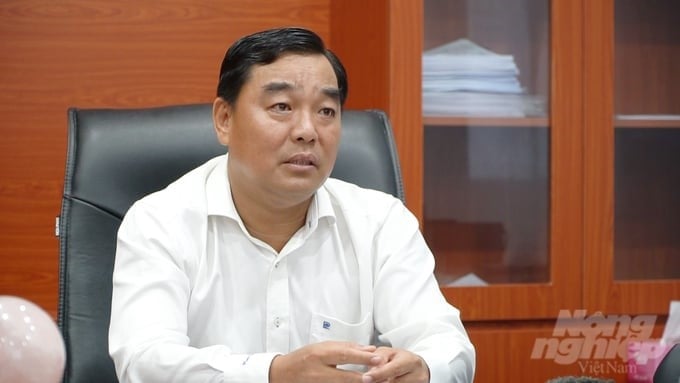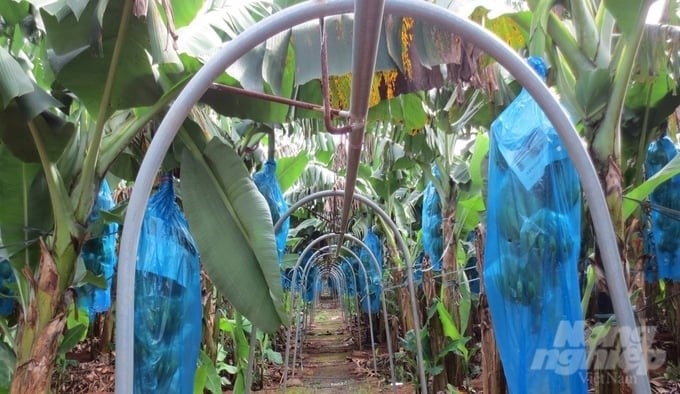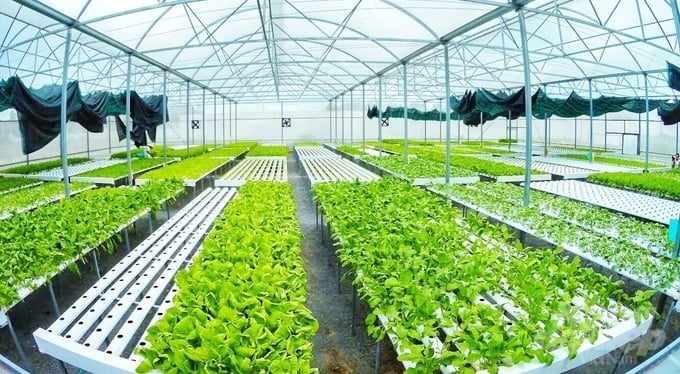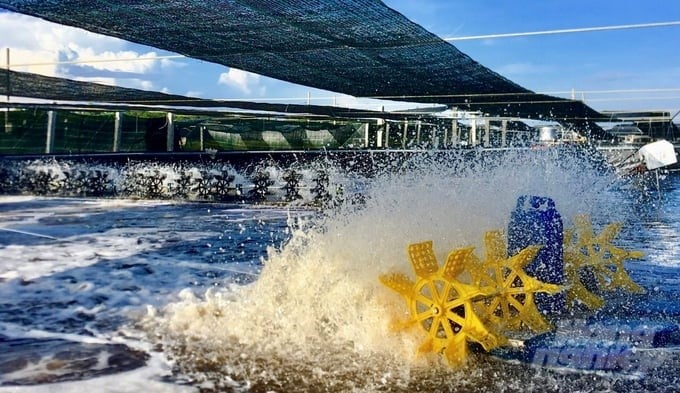May 20, 2025 | 14:31 GMT +7
May 20, 2025 | 14:31 GMT +7
Hotline: 0913.378.918
May 20, 2025 | 14:31 GMT +7
Hotline: 0913.378.918
Recently, Ba Ria - Vung Tau organized a conference to deploy Ba Ria - Vung Tau provincial planning for the 2021–2030 period, vision to 2050, and promote provincial investment. Accordingly, provincial planning organizes the province's development space into four functional areas, including: industry and seaport; tourism and marine urban areas; agriculture and ecological balance; and sea areas and islands.
Thus, high-tech agriculture is no longer one of the four motivational pillars of the province, which was originally the content determined by the Ba Ria - Vung Tau Party Committee at the beginning of the 2020–2025 term.

Mr. Huynh Son Thai, Director of the Ba Ria - Vung Tau Department of Agriculture and Rural Development. Photo: Le Binh.
Vietnam Agriculture Newspaper’s reporter had an exchange with Mr. Huynh Son Thai, Director of the Ba Ria - Vung Tau Department of Agriculture and Rural Developmen, about the province's orientation and its high-tech agricultural achievements in recent times.
Sir, according to the province’s new planning approved by the Prime Minister, what is the plan for the development of the agriculture sector?
According to the provincial planning approved by the Prime Minister, the planning for the agricultural sector has set out the following goals, tasks, and solutions:
First, develop the main agriculture as ecological, organic, and environmentally friendly agriculture. Restructure agriculture based on factors of efficiency, ecology, sustainability, and applying safe production chain processes. At the same time, pay attention to building growing area codes and livestock farming associated with traceability, linking agricultural and fishery production with tourism development, and biodiversity conservation.
Second, Ba Ria - Vung Tau focuses on sustainable forest management, protection, and development; promoting the role and effects of forests, thereby contributing to environmental protection, natural disaster reduction, and proactively and effectively responding to climate change. The province will strengthen the conservation of natural resources and biodiversity, enriching the forest ecosystem.

Pulleys for transporting bananas in Chau Duc district help reduce labor and maintain product design.
Third, restructure aquaculture and seafood exploitation, not setting a goal of increasing output but mainly focusing on improving product quality. Prioritize the development of offshore fishing vessels and aquaculture towards organic and ecologically sustainable farming, efficiency, and strongly developing aquaculture at sea. Build a fisheries logistics service center in the Southeast region and invest, exploit, and promote the effectiveness of seafood exploitation infrastructure projects.
Fourth, Ba Ria - Vung Tau continues to implement the National Target Program to build new rural areas associated with restructuring the agriculture sector and developing the rural economy, helping to improve the material and spiritual lives of rural people.
Fifth, strive to ensure that the per capita income of rural people in Ba Ria - Vung Tau in 2030 will increase 1.7–2 times compared to 2020.
Sixth, by 2030, the proportion of agricultural products produced in forms of cooperation and linkages will reach over 50%. The value of agricultural production and aquaculture following ecological and organic models accounts for over 30% of the province's agricultural production value.
Seventh, continue to improve the quality of recognized high-tech agricultural areas. We will continue to attract investors with potential in capital, technology, and market to invest in production and link with the province's raw material areas to develop concentrated agricultural areas in a high-tech, ecological, organic, and circular direction.
What are the orientations of the Provincial Department of Agriculture and Rural Development for the development of each field in the industry, sir?
For each field of the industry, we have developed specific orientations as follows:
For the field of cultivation: Develop concentrated growing areas of rice, vegetables, ornamental plants, rubber, pepper, cocoa, fruit trees, cashew, and coffee. We focus on building high-tech vegetable and fruit production areas in Dat Do, Phu My, Xuyen Moc, and Chau Duc districts. The Department of Agriculture and Rural Development also strives to achieve 1.5% of the area certified for organic agriculture compared to the area of agricultural land for staple crops.

Vegetables are grown by the hydroponics method of Sao Mai Company, Dat Do district.
For the livestock industry: Relocate and terminate livestock farming activities in inner-city areas of cities, towns, townships, and residential areas where livestock farming is not allowed. Do not develop concentrated livestock farming in the communes of Ba Ria city, Vung Tau city, Phu My town, and the entire Con Dao district.
Building concentrated livestock farming areas with high-tech applications and disease-free livestock farming areas in the 3 districts of Chau Duc, Dat Do, and Xuyen Moc. In addition, there will be investment in developing industrial slaughter facilities with modern technology.
For the seafood field: Restructure aquaculture and seafood exploitation. Do not set a goal of increasing seafood exploitation output. Strictly control and reduce fishing vessels exploiting coastal waters and trawling vessels. Prioritize the development of offshore fishing vessels using fishing and seine fishing professions; focus on the work of preserving products after exploitation and ensuring quality and food safety.
Plan fishing port systems and storm shelter areas; build Ba Ria - Vung Tau province’s large fishery center in Go Gang associated with the Southeast fishing grounds according to the planning approved by the Prime Minister.
In addition, we develop aquaculture in three ecological zones: freshwater; brackish, and salt water; and marine farming in an organic, ecologically sustainable, and effective direction. Priority is also given to developing cage farming in rivers, at sea, along the coast, and on islands in a high-tech direction.

High-tech aquaculture is also a priority for Ba Ria - Vung Tau to develop in the coming time.
For the forestry field: Focus on managing, protecting, and developing sustainable forests; conserve natural resources and biodiversity in forest ecosystems. Ba Ria - Vung Tau continues to promote concentrated afforestation in the planned area of three forest types (special-use forests, protection forests, and production forests), especially investing in developing mangrove forests and coastal forests.
For the irrigation field: Continue to build, repair, and upgrade modern and synchronous irrigation and natural disaster prevention project systems to increase irrigation service capacity to over 29,900 hectares by 2045; supply domestic water of over 110 million m3 by 2030 and over 121 million m3 by 2045. Ba Ria - Vung Tau will invest in and build the Song Ray 2 water reservoir in a multi-purpose direction.
High-tech agriculture is no longer one of the four motivational pillars. So, in the coming time, how will the planning for agriculture in general and high-tech agriculture in particular be oriented toward development, sir?
The provincial planning for the 2021–2030 period, vision to 2050, determines a focus on sustainable development and economic growth in economic sectors such as industry, seaports and logistics services, and tourism and urban areas. The agriculture sector only accounts for 6–6.5% of the total economic structure of the province. High-tech agriculture is not the province's economic pillar.
However, developing high-tech agriculture is still considered an inevitable trend in modern agricultural production. This is a solution to create safe, productive, quality, and highly competitive agricultural products. Thereby contributing to promoting agricultural restructuring; specifically, by 2023, the value of high-tech agricultural production reached over 33% and will be 50% by 2025.

High-tech agriculture is an inevitable trend in modern agricultural production.
Therefore, according to provincial planning, high-tech agriculture is still identified as the goal and solution to promote restructuring of the agriculture sector and maintain the sector's growth rate. The development orientation is specified as follows:
First, improve recognized quality and develop high-tech farming areas. Dat Do and Xuyen Moc districts are planning to invest in developing high-tech aquaculture areas. Build disease-free livestock farming areas with high-tech applications in the three districts of Chau Duc, Dat Do, and Xuyen Moc.
Second, continue to attract businesses and investors with potential in capital, technology, and markets to invest in production and link with the province's raw material areas to develop concentrated agricultural areas in a high-tech, ecological, organic, and circular direction.
Third, it is necessary to disseminate, advertise, promote trade, and promote linkages in the production and consumption of high-tech agricultural products.
Fourth, it is necessary to continue to develop markets and services to support high-tech activities in agriculture.
Thank you, sir!
Translated by Huyen Vu Thu

(VAN) In 2024, over 295 million people across 53 countries and territories faced acute hunger—an increase of almost 14 million people compared to 2023, while the number of people facing catastrophic levels of hunger reached a record high.

(VAN) World Environment Day 2025 (June 5) carries the theme 'Beat Plastic Pollution' continuing to emphasize the global urgency of addressing the plastic waste crisis.

(VAN) This was the assessment shared by experts at the workshop titled 'Assessing the Role and Potential of Low-Emission Rice Production Systems in Vietnam,' held on the morning of May 19.

(VAN) Cai Rong Port is the fisheries control center of Quang Ninh, helping to monitor fishing vessels, combat IUU fishing, and remove the EC's 'yellow card'.

(VAN) The German Agricultural Society (DLG) explores the possibility of establishing a mechanization service center in Vietnam’s Mekong Delta to support farmers in accessing and utilizing advanced machinery.

(VAN) On May 16, the Department of Water Resources Management, in collaboration with the Food and Agriculture Organization of the United Nations (FAO), held a signing ceremony for the GEF-8 project document.

(VAN) Food safety, mechanization, vocational training, and market opening are key areas of cooperation expected between the Vietnamese Government and the Federal Republic of Germany.